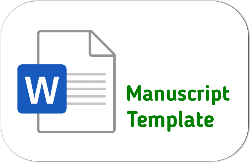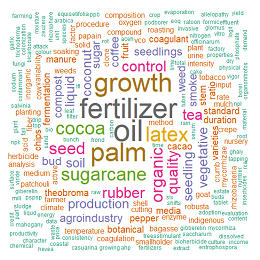Respons Pertumbuhan Bibit Kelapa Sawit dengan Pemberian Kompos Pelepah, Tandan Kosong Kelapa Sawit, dan Air Cucian Beras
DOI:
https://doi.org/10.25181/jaip.v10i1.2456Keywords:
midrib, oil palm empty, seedlingAbstract
In oil palm plantations, compost application for plants aims to support a sustainable cropping system. The study aimed to determine the effect of oil palm midrib compost, oil palm empty fruit bunches and rice washing water on the growth of oil palm seedlings in the main nursery. The experiment was conducted at the Ciparanje Experimental Garden, Faculty of Agriculture, Padjadjaran University, from February 2020 to August 2020. The experiment was conducted using an experimental method using a randomised block design consisting of twelve treatments with three replications. The treatments included the application of inorganic fertilisers, oil palm midrib compost, oil palm empty fruit bunch compost and rice washing water either singly or in a combination of the three. Observations were made on the variables of increase in plant height, increase in stem girth, increase in the number of palm midribs, and leaf chlorophyll content. The F (Fisher) test analysed observational data at a 95% confidence level, followed by Duncan's multiple range test at a 95% confidence level. Data analysis using the SASM-Agri application. A mixture of 1.600 g of oil palm midrib compost, 100 g of oil palm empty fruit bunch compost with 500 ml of rice washing water can be used as a reference for the composition of organic fertiliser for oil palm seedlings, especially its effect on the increase of stem girth and leaf chlorophyll content.Downloads
References
Ariyanti, M., Anjarsari, I. R. D., & Natali, G. (2019). Utilization of organic fertilizer made out of oil palm midbrid in oil palm nursery. International Journal on Advance Science Engineering Information Technology, 9(4), 1324-1329.
Ariyanti, M. (2021a). Kelapa sawit: Pengelolaan Bahan Organik dan Air untuk Mendukung ISPO. Unpad Press.
Ariyanti, M. (2021b). Manfaat pelepah sebagai sumber bahan organik pada media tanam kelapa sawit. J. Paspalum, 9(1), 77-85.
Ariyanti, M., Ratningsih, N., Suherman, C., Rosniawaty, S., & Asbur, Y. (2021c). Effects of oil palm midrib compost and humic acid on the growth and water use of immature oil palm (Elaeis guineensis). J. on Crops, 22(1), 74-86.
Evanita, E., Widaryanto, E., & Suwasono, Y. B. (2012). Pengaruh pupuk kandang sapi pada pertumbuhan dan hasil tanaman terong (Solanum melongena L.) pada pola tanam tumpangsari dengan rumput gajah (Penisetum purpureum) tanaman pertama. J. Produksi Tanaman, 2(7), 533-541.
Hartono, B., Adiwirman, & Manurung, G. M. E. (2014). Teknik budidaya tanaman kelapa sawit (Elaeis guineensis Jacq.) belum menghasilkan di lahan pasang surut yang dilakukan petani di Kecamatan Bangko Pusako Kabupaten Rokan Hilir. Jurnal Online Mahasiswa Fakultas Pertanian Universitas Riau, 1(2), 1-15.
Leghari, S. J., Wahocho, N. A., Laghari, G. M., Talpur, K. H., Wahocho, S. A., & Lashari, A. A. (2016). Role of nitrogen for plant growth and development: A review. Advances in Environmental Biology (Jordon), 10(9), 209–218.
Manuhuttu, A. P., Rehatta, H., & Kailola, J. J. G. (2014). Pengaruh konsentrasi pupuk hayati bioboost terhadap peningkatan produksi tanaman selada (Lactuca sativa L.). J. Agrologia, 3(1), 18 -27.
Mirwan, M. (2015). Optimasi pengomposan sampah kebun dengan variasi aerasi dan penambahan kotoran sapi sebagai bioaktivator. J. Teknik Lingkungan. 4(6), 61- 66.
Panggabean, S. M., & Purwono. (2017). Manajemen pemupukan tanaman kelapa sawit (Elaeis guineensis Jacq.) di Pelantaran Agro Estate, Kalimantan Tengah. Bul. Agrohorti, 5(3), 316-324.
Paramananthan, S. (2013). Managing marginal soils sustainabile growth of oil palms in the tropics. J. Oil Palm Environ, 4, 1-16.
Permentan. (2011). Peraturan menteri pertanian tentang pupuk organik, pupuk hayati, dan pembenah tanah, 70. Menteri Pertanian Indonesia. Retrieved November 12, 2019, from http://perundangan.pertanian.go.id/admin/file/Permentan-70-11.pdf
Salamat, S. S., Hassan, M. A., Shirai, Y., Hanif, A. H. M., Arifin, I., and Norizan, M. S. (2019). Application of compost in mixed media improved oil palm nursery's secondary root structure thereby reducing the fertilizer requirement for growth. J. Mol. Biol. Biotechnology, 27(3), 39-49.
Sembiring, J. V., Nelvia, & Yulia, A. E. (2015). Pertumbuhan bibit kelapa sawit (Elaeis guineensis Jacq.) di pembibitan utama pada medium sub soil ultisol yang diberi asam humat dan kompos tandan kosong kelapa sawit. J. Agroteknologi, 6(1), 25-32.
Sitio, Y., Wijana, G., & Raka, I. G. N. (2015). Pemanfaatan tandan kosong kelapa sawit dan pupuk nitrogen sebagai substitusi topsoil terhadap pertumbuhan bibit kelapa sawit (Elaeis guineensis Jacq.) periode pre nursery. E-Jurnal Agroekoteknologi Tropika, 4(4), 264 – 273.
Sukmawan, Y. (2014). Peranan Pupuk Organik dan Anorganik terhadap Pertumbuhan Kelapa Sawit (Elaeis guineensis Jacq.) Umur Satu Tahun pada Tanah Marginal [Unpublished graduate thesis]. Institut Pertanian Bogor.
Verheye, W. (2010). Growth and production of oil palm. In Land use, land cover and soil sciences. UNESCO-EOLSS Publishers.
Wardiah, Linda, & Rahmatan, H. (2016). Potensi limbah air cucian beras sebagai pupuk organik cair pada pertumbuhan pakchoy (Brassica rapa L.). J. Biologi Edukasi, 6(1), 34-38.
Webb, M. J., Nelson, P. N., Rogers, R. G., & Curry, G. N. (2011). Site specific fertilizer recommendations for oil palm smallholdres information from large plantations. J. Plant Nutr. Soil Sci., 174, 311-320.
Wulandari, C., Muhartini, S., & Trisnowati, S. (2012). Pengaruh air cucian beras merah dan beras putih terhadap pertumbuhan dan hasil selada (Lactuca sativa L.). Jurnal Vegetalika, 1(2), 24-35.
Yang, H., Li, J., Yang, J., Wang, H., Zou, J., & He, J. (2014). Effects of nitrogen application rate and leaf age on the distribution pattern of leaf SPAD readings in the rice canopy. PloS one, 9(2), e88421.
Downloads
Published
How to Cite
Issue
Section
License
Copyright (c) 2022 Mira Ariyanti, Farin Gelsbrata Firma, Santi Rosniawaty, Cucu Suherman

This work is licensed under a Creative Commons Attribution-ShareAlike 4.0 International License.
Authors who publish with Jurnal Agro Industri Perkebunan agree to the following terms:
Authors retain copyright and grant the Jurnal Agro Industri Perkebunan right of first publication with the work simultaneously licensed under a Creative Commons Attribution License (CC BY-SA 4.0) that allows others to share (copy and redistribute the material in any medium or format) and adapt (remix, transform, and build upon the material for any purpose, even commercially) with an acknowledgment of the work's authorship and initial publication in Jurnal Agro Industri Perkebunan.
Authors are able to enter into separate, additional contractual arrangements for the non-exclusive distribution of the journal's published version of the work (e.g., post it to an institutional repository or publish it in a book), with an acknowledgment of its initial publication in Jurnal Agro Industri Perkebunan. Authors are permitted and encouraged to post their work online (e.g., in institutional repositories or on their website) prior to and during the submission process, as it can lead to productive exchanges, as well as earlier and greater citation of published work.


























